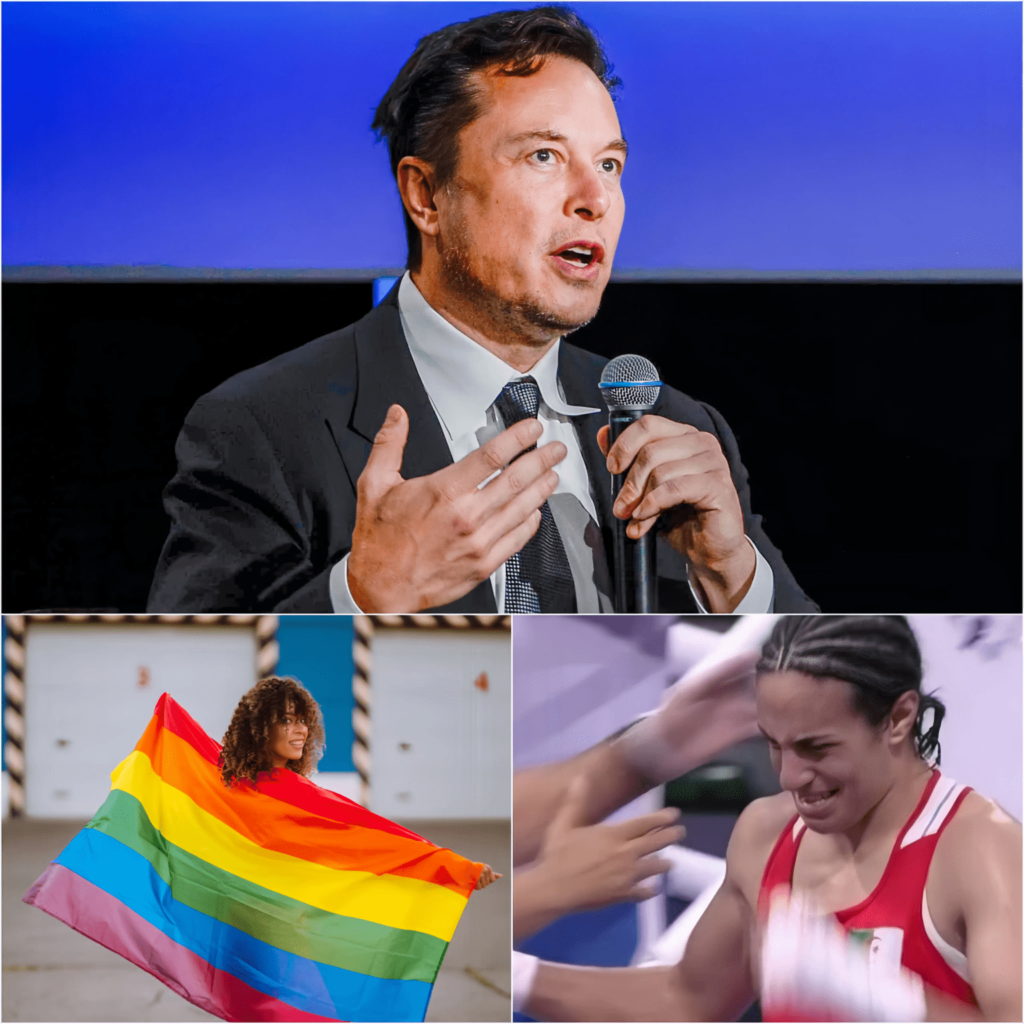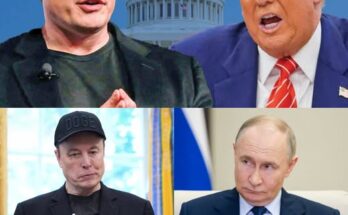A viral claim has been circulating online, alleging that Elon Musk stated pride flags should be banned in classrooms “forever” after defeating Algerian boxer Imane Khelif at the Olympics. However, there is no truth to this claim, and it has been widely debunked.
First and foremost, Elon Musk is not an athlete and has never competed in the Olympics. There is no record of him participating in any sporting event, let alone defeating Imane Khelif, a professional boxer. This fact alone disproves a major portion of the claim.
Additionally, there is no evidence that Musk made any statement about banning pride flags in classrooms. No reputable news source has reported on such a comment, and there are no verified posts from Musk himself addressing this issue.

Debunking the Viral Claim About Elon Musk and Pride Flags
A viral claim has been circulating on social media, alleging that Elon Musk stated that pride flags should be banned in classrooms “forever” after defeating Algerian boxer Imane Khelif at the Olympics. However, this claim is completely false and has been widely debunked.
Elon Musk is Not an Athlete
Firstly, Elon Musk is not an athlete, and there is no record of him ever competing in the Olympics or in any professional sporting event. Musk is best known for his role as the CEO of Tesla, SpaceX, and several other ventures, and he has never participated in a boxing match or any Olympic event. The claim that he defeated Imane Khelif, a renowned Algerian boxer, is entirely fabricated.
No Evidence of Such a Statement
Furthermore, there is no evidence to support the claim that Musk ever made any statement about banning pride flags in classrooms. No reputable news outlet has reported such an incident, and there are no verified social media posts from Musk addressing this matter. Given Musk’s active presence on platforms like Twitter, any significant statement would likely be documented by credible sources, yet no such record exists.
Conclusion
This viral claim appears to be a baseless rumor with no factual foundation. Elon Musk’s involvement in any Olympic event, particularly defeating an athlete like Imane Khelif, is a complete fabrication. Additionally, there is no reliable information indicating Musk has ever made a statement about banning pride flags in classrooms. As with many viral claims, it is important to verify information from trusted sources before accepting it as true.

The claim appears to have originated from social media, where satirical or misleading content often spreads without proper verification. Many users who encountered the story failed to question its authenticity, leading to further misinformation.
Musk has been known to make controversial statements on social and political issues, particularly on his social media platform, X (formerly Twitter). However, this particular claim does not have any factual basis.
The Spread of Misinformation and the Role of Social Media
In the digital age, the spread of misinformation has become a widespread issue, with social media platforms playing a pivotal role in its propagation. The rapid dissemination of content through these platforms, coupled with the ease of sharing and the absence of stringent fact-checking mechanisms, allows rumors, satirical posts, and misleading content to reach vast audiences before anyone has a chance to verify their authenticity. One particular claim that has recently emerged serves as a stark reminder of this phenomenon and how misinformation can take root, often causing confusion and distrust among users. This claim, which appears to have originated from social media, revolves around a statement attributed to Elon Musk, the well-known CEO of SpaceX and Tesla, and the owner of the platform X (formerly known as Twitter). While Musk is notorious for his controversial and often polarizing remarks, this particular claim does not have any factual basis and serves as a clear example of how misinformation spreads online.
Social Media and the Spread of Misinformation
Social media platforms like X (Twitter), Facebook, Instagram, and others are designed to facilitate the rapid exchange of ideas, opinions, and news. While these platforms provide a space for people to connect and share information, they also enable the quick dissemination of unverified content. The ease with which users can post and share content, without any immediate consequences for spreading false or misleading information, creates a fertile ground for misinformation to thrive. The algorithms governing these platforms tend to prioritize content that generates high engagement, regardless of its veracity. This leads to sensational headlines, inflammatory statements, and even completely fabricated stories gaining traction among users.
In the case of the recent claim about Musk, it appears that the story gained significant attention through social media channels. The initial post, which likely contained a sensational or controversial statement, was shared widely, attracting the attention of individuals who may have been more interested in the drama surrounding Musk than in verifying the facts. The claim was passed around through retweets, shares, and comments, with many users simply accepting it as truth without questioning its source or context. This is not an isolated incident; rather, it reflects a broader trend of how misinformation can quickly snowball on social media.
The Role of Satirical Content and Its Misinterpretation
A significant portion of the misinformation circulating on social media is the result of satirical or humorous content being misunderstood as fact. In the case of Musk, it is possible that the claim in question originated from a satirical post, which was then taken out of context and presented as a serious statement. Satirical content is often designed to exaggerate or parody real events or statements, and its primary goal is to entertain or provoke thought. However, when users encounter such content without understanding its context or intent, they may mistake it for legitimate news or an official statement.
Satirical content is particularly prone to misinterpretation because it often mimics the style of serious journalism, using similar formats, language, and even logos or branding. This can make it difficult for casual users to differentiate between genuine news and parody. Furthermore, once a piece of satirical content is shared by a popular account or influencer, it can quickly gain traction, leading many users to believe it is true, even if they initially found it amusing or absurd. The claim about Musk could very well have been a piece of satire that was misinterpreted and amplified by others, with little effort made to verify its authenticity before it was shared further.
The Lack of Fact-Checking in the Age of Social Media
One of the key factors contributing to the spread of misinformation on social media is the lack of robust fact-checking mechanisms. While traditional news outlets and reputable publications often employ fact-checkers to verify the accuracy of their reporting, social media platforms generally do not have such systems in place. Instead, they rely on user-driven content and algorithms that prioritize engagement over accuracy. This creates a situation where false information can easily go viral, and users may not be aware that they are consuming or sharing misinformation.
While platforms like X and Facebook have taken steps to combat misinformation, including flagging false claims and providing users with links to fact-checking sources, these measures are often insufficient. In many cases, users ignore or bypass these warnings, continuing to share content without considering its reliability. Additionally, the sheer volume of content shared on social media makes it difficult for platforms to keep up with every false or misleading claim. As a result, misinformation continues to spread unchecked, with some claims persisting for days, weeks, or even longer.
In the case of Musk’s alleged statement, the lack of fact-checking may have contributed to the rapid spread of the claim. Once it gained momentum, it became harder to correct or disprove, as more and more users shared it without questioning its truth. Even when reliable sources debunked the claim, the misinformation had already reached a critical mass, and many users remained unaware of its falsehood.
Musk’s Role in Controversial Statements
Elon Musk is no stranger to making controversial statements on social and political issues. His presence on X has often been marked by polarizing comments that have sparked heated debates online. Musk is known for his unconventional approach to communication, often bypassing traditional media channels and using his Twitter account to directly share his thoughts with the public. This has led to both admiration and criticism, as some view him as a maverick unafraid to challenge the status quo, while others accuse him of making reckless or inflammatory remarks.
Given Musk’s reputation for speaking his mind, it is not surprising that any statement attributed to him would attract attention. However, in this instance, the claim in question does not appear to have any factual basis. It is possible that the claim was fabricated entirely or that it was taken out of context to create a narrative that would generate controversy. Musk’s detractors may have seized upon this opportunity to spread misinformation about him, while his supporters may have been quick to dismiss or deny it without verifying the details.
The Consequences of Misinformation
The consequences of misinformation can be far-reaching, particularly when it involves high-profile individuals like Elon Musk. Misinformation can damage reputations, incite public outrage, and even influence political or social decisions. When users fail to question the authenticity of a claim, they contribute to the cycle of misinformation that perpetuates confusion and distrust. In the case of Musk, the false claim may have led to confusion among his followers, with some believing it to be true and others dismissing it as another example of online rumor-mongering.
Moreover, the spread of misinformation on social media has broader societal implications. It can contribute to the erosion of trust in institutions, including the media, government, and technology companies. When users encounter false or misleading information regularly, they may become skeptical of all sources of information, even those that are reliable and factual. This creates a fertile ground for conspiracy theories and other forms of harmful misinformation to take hold.
Conclusion
The claim about Elon Musk that recently spread on social media serves as a reminder of the dangers of misinformation in the digital age. Social media platforms, while offering unprecedented opportunities for communication, also facilitate the rapid spread of unverified content. Satirical posts, misleading headlines, and outright fabrications can quickly gain traction, often without being subjected to proper fact-checking. In the case of Musk, the claim lacked any factual basis, yet it spread widely due to the dynamics of social media engagement and the tendency of users to accept content without questioning its authenticity. As misinformation continues to be a persistent issue, it is crucial for individuals to develop critical thinking skills and be more discerning about the content they consume and share online.


